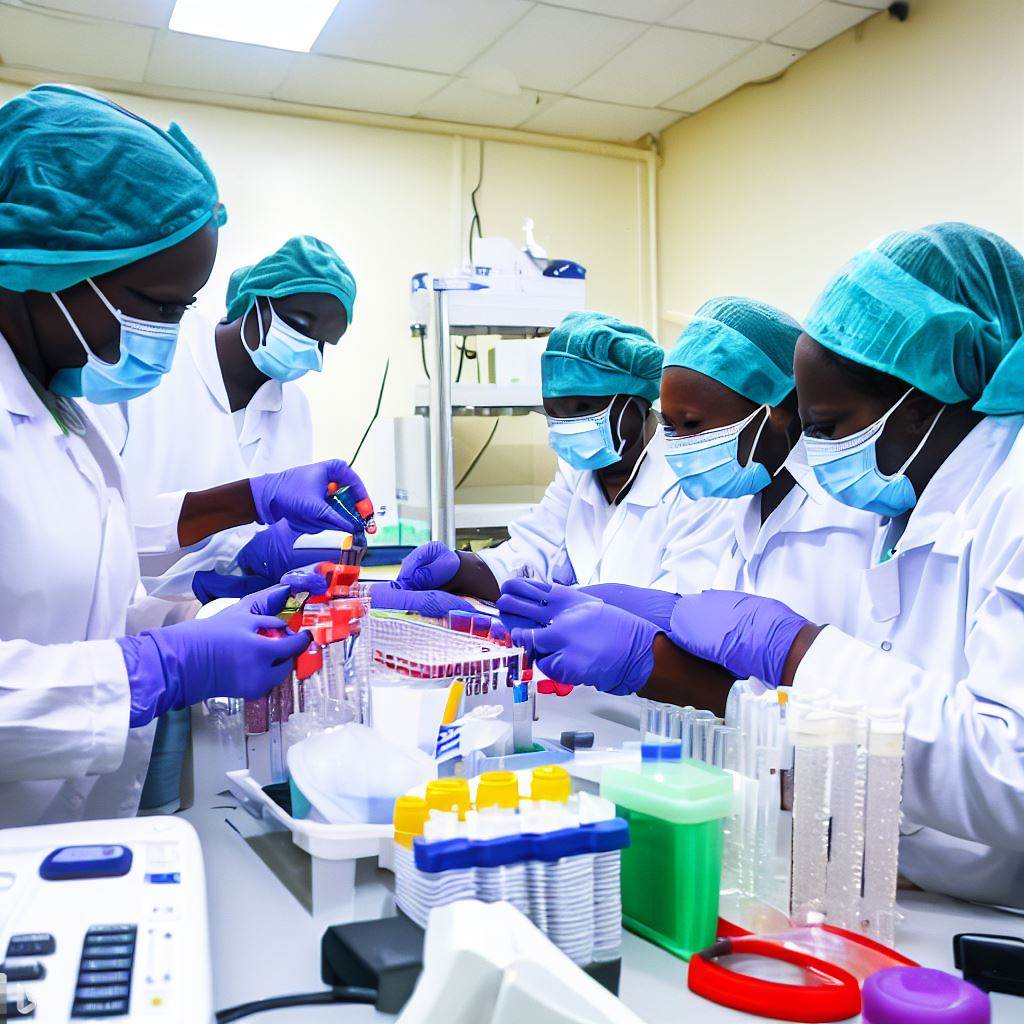Introduction
Lab technicians play a crucial role in Nigeria’s healthcare system. They are essential for providing quality healthcare services in the country.
- Lab technicians in Nigeria play a pivotal role in the healthcare system.
- Their expertise aids in disease diagnosis, treatment, and prevention.
- They perform various tests, including blood, urine, and tissue analysis.
- Accuracy and precision are paramount to ensure reliable results.
- Lab technicians collaborate with doctors, nurses, and other healthcare professionals.
- Their work is crucial in detecting infectious diseases and monitoring patient progress.
- Quality laboratory services contribute to better patient outcomes.
- In rural areas, lab technicians may be the sole diagnostic support.
- Continuous training is essential to keep up with advancing medical technology.
This blog post will explore the significant impact of lab technicians in Nigeria’s healthcare.
Overview of Nigeria’s Healthcare System
The Current State of Nigeria’s Healthcare System: A Discussion
Nigeria’s healthcare system faces various challenges despite being the largest economy in Africa. The healthcare infrastructure is inadequate, with a shortage of facilities and medical professionals.
Access to quality healthcare is limited, especially in rural areas, leading to a high disease burden. Public hospitals are overcrowded, understaffed, and lack essential resources for effective treatment.
Nigeria’s healthcare system is predominantly financed through out-of-pocket payments, creating financial barriers for many.
The government’s allocation to healthcare is insufficient, resulting in a significant funding gap.
Challenges Faced by Nigeria’s Healthcare System
- Limited access to healthcare services due to geographic and socioeconomic factors.
- Inadequate training and shortage of skilled healthcare professionals, including lab technicians.
- Insufficient medical equipment and supplies, hindering the quality of care provided.
- High prevalence of infectious diseases, such as malaria, HIV/AIDS, and tuberculosis.
- Inconsistent regulatory frameworks, affecting the quality control of healthcare facilities.
- Lack of public awareness regarding preventive healthcare measures and health education.
- Brain drain, as many qualified healthcare professionals leave Nigeria for better opportunities abroad.
- Corruption and mismanagement of healthcare funds, leading to inefficiency and poor service delivery.
- Limited implementation of technology in healthcare, hindering advancements and data management.
- Weak integration of primary healthcare services and referral systems, impacting continuity of care.
Role of Lab Technicians in Nigeria’s Healthcare System
Lab technicians play a crucial role in Nigeria’s healthcare system by assisting in disease diagnosis and treatment.
They perform various laboratory tests, including blood, urine, and tissue analysis, to aid in medical investigations.
Lab technicians ensure accuracy in test results, helping healthcare professionals make informed decisions.
They assist in the identification and monitoring of infectious diseases, contributing to public health surveillance.
Lab technicians also play a vital role in research and development, helping advance medical knowledge in Nigeria.
With their expertise, they contribute to improved patient outcomes and overall healthcare quality. Lab technicians work closely with other healthcare professionals to provide comprehensive and timely care.
Despite the challenges faced by Nigeria’s healthcare system, lab technicians continue to serve with dedication.
Their commitment to their role helps bridge gaps and enhance healthcare services in Nigeria.
Recognizing the importance of lab technicians and addressing the challenges they face is crucial for the improvement of Nigeria’s healthcare system.
In the end, Nigeria’s healthcare system faces numerous challenges, including limited access, inadequate infrastructure, and financial barriers.
Lab technicians play a vital role in overcoming these challenges by providing accurate and timely laboratory services.
However, addressing the systemic issues within Nigeria’s healthcare system is essential to create sustainable improvements and ensure quality healthcare for all Nigerians.
Read: The Future of Diagnostic Medical Sonography in Nigeria
Definition and Responsibilities of Lab Technicians
Role of Lab Technicians in the Healthcare Industry
Lab technicians are professionals who perform various laboratory tests to aid in medical diagnosis.
They play a crucial role in supporting physicians and healthcare providers in making accurate and timely treatment decisions. Lab technicians work behind the scenes but are vital members of the healthcare team.
Primary Responsibilities and Duties of Lab Technicians
Collecting and preparing patient samples, such as blood, urine, and tissue, for analysis. Performing laboratory tests using automated equipment, advanced technologies, and manual techniques.
Recording and maintaining accurate data and results of the tests conducted. Ensuring the proper calibration, cleaning, and maintenance of laboratory equipment.
Following strict protocols and safety procedures to avoid contamination and ensure reliable results.
Collaborating with other healthcare professionals to interpret test results and provide accurate and timely information.
Participating in quality control and quality assurance activities to maintain accuracy and precision of test results. Adhering to ethical guidelines and maintaining patient confidentiality at all times.
Staying updated with advancements in laboratory medicine and technological innovations. Assisting in research studies and clinical trials to contribute to medical advancements.
Read: The Role of Exercise Physiology in Nigeria’s Sports Industry
The Importance of Lab Technicians in Diagnosing and Treating Diseases
Lab technicians play a critical role in disease detection and monitoring, aiding in accurate diagnoses. They help identify specific pathogens, bacteria, viruses, and abnormalities within patient samples.
The accuracy of lab test results directly impacts treatment decisions and patient outcomes.
Lab technicians assist in determining the presence and severity of diseases, helping doctors tailor appropriate treatment plans.
They help monitor the effectiveness of medications and treatment regimens through regular testing. Lab technicians are essential in detecting and preventing the spread of infectious diseases.
They contribute to public health by conducting screenings and surveillance to identify potential outbreaks. Lab technicians also aid in the development and monitoring of vaccines and therapies.
Their expertise ensures the safe and reliable functioning of healthcare facilities. The role of lab technicians is crucial in delivering quality healthcare services and maintaining patient safety.
In review, lab technicians are integral players in Nigeria’s healthcare industry. Their responsibilities include sample collection, performing tests, recording data, and collaborating with healthcare professionals.
Their contributions aid in accurate disease diagnoses, treatment decisions, and monitoring patient health.
Lab technicians contribute significantly to the overall healthcare system by ensuring reliable test results and maintaining patient safety.
Read: Challenges Faced by Clinical Lab Technicians in Nigeria
Training and Education Requirements for Lab Technicians in Nigeria
Overview of Education and Training
To become a lab technician in Nigeria, individuals need to obtain the necessary education and training. This typically involves completing specific educational programs and acquiring hands-on experience in the field.
Lab technicians in Nigeria usually start their journey by earning a high school diploma or its equivalent.
Following this, aspiring lab technicians can pursue post-secondary education, such as an Associate’s Degree in Medical Laboratory Science or a related field.
These educational programs provide students with a solid foundation in the sciences, including courses like biology, chemistry, and microbiology.
Additionally, they also focus on developing the necessary laboratory skills and techniques required for the job.
Furthermore, students may have the opportunity to gain practical experience through internships or clinical rotations in healthcare settings.
This hands-on training allows them to apply their knowledge in real-world scenarios and work alongside experienced professionals.
It is essential for lab technicians to stay updated with the latest advancements in the field.
Continuous education and training through workshops, seminars, and professional development programs can help them enhance their skills and expand their knowledge.
Certification and Licensing Process
Once the educational requirements are met, lab technicians in Nigeria need to undergo the certification and licensing process.
This ensures that they meet the necessary standards and regulations set by relevant authorities.
The Medical Laboratory Science Council of Nigeria (MLSCN) is the regulatory body responsible for certifying and licensing lab technicians in the country.
They establish guidelines and requirements that individuals must fulfill to practice as qualified professionals.
In order to obtain certification, aspiring lab technicians must pass the MLSCN certification examination.
This comprehensive test assesses their theoretical knowledge, practical skills, and competency in various areas of medical laboratory science.
After passing the certification examination, individuals can then proceed to apply for their practicing license with the MLSCN.
This license provides legal authorization to work as a lab technician in Nigeria.
It is important to note that lab technicians need to renew their practicing license regularly, usually every two years.
This process involves meeting certain continuing education requirements, which ensure that professionals stay updated with industry advancements and maintain their competence.
In fact, becoming a lab technician in Nigeria requires individuals to complete the necessary education and training.
This includes obtaining a high school diploma, pursuing post-secondary education in medical laboratory science, and gaining practical experience.
Additionally, lab technicians must undergo the certification and licensing process conducted by the MLSCN to ensure their competency and adherence to professional standards.
Read: Current Trends in Nigeria’s Clinical Lab Tech Field
Contribution of Lab Technicians to Nigeria’s Healthcare System
The Crucial Contributions of Lab Technicians in Diagnosing Diseases and Conditions
Lab technicians play a crucial role in accurately identifying and diagnosing diseases and medical conditions. They perform various laboratory tests on patient samples, such as blood, urine, and tissue samples.
These tests help in detecting and monitoring diseases like diabetes, HIV, cancer, and infectious diseases. Lab technicians possess the specialized knowledge and skills to handle and analyze lab samples.
They ensure that the lab equipment is calibrated correctly and maintained properly for accurate results. Lab technicians follow strict quality control procedures to guarantee the reliability and validity of test results.
They collaborate with other healthcare professionals to interpret and communicate test findings to patients and doctors.
Their accurate and timely diagnoses enable doctors to provide appropriate treatment plans for patients.
Lab technicians also contribute to disease surveillance and monitoring programs, helping identify outbreaks and trends.
The Role of Lab Technicians in Conducting Medical Research and Clinical Trials
Lab technicians actively participate in medical research studies and clinical trials to advance healthcare knowledge.
They assist in designing and implementing research experiments and data collection processes. Lab technicians handle and analyze research samples to generate valuable scientific data.
They utilize sophisticated laboratory techniques and technologies to study diseases and develop innovative treatments.
Lab technicians coordinate with research teams to ensure adherence to ethical and safety guidelines. They meticulously document research procedures, observations, and results to facilitate data analysis.
Lab technicians contribute to the discovery and evaluation of new drugs, treatments, and medical devices. They rigorously follow research protocols to maintain the integrity and validity of scientific studies.
Their expertise in laboratory methodologies and techniques enhances the credibility and reliability of research findings.
Lab technicians work alongside scientists and researchers to publish research papers and present findings at conferences.
They actively pursue continuing education to stay updated with the latest advancements in their field.
In essence, lab technicians in Nigeria play a vital role in the healthcare system. Their specific contributions involve diagnosing diseases and conditions accurately and conducting medical research and clinical trials.
Lab technicians’ expertise in laboratory techniques, equipment handling, and data analysis helps in diagnosing and monitoring diseases, ultimately aiding doctors in providing effective treatment plans.
Additionally, their involvement in medical research and clinical trials contributes to the advancement of healthcare knowledge and the development of innovative treatments.
Lab technicians’ commitment to quality, accuracy, ethics, and continuous learning demonstrates their essential role in maintaining and improving Nigeria’s healthcare system.
Read: Nigeria’s Top Schools for Aspiring Lab Technicians

Challenges Faced by Lab Technicians in Nigeria
Challenges Faced by Lab Technicians in Nigeria’s Healthcare System
- Lack of resources
- Inadequate lab equipment
- Limited funding
- Poor working conditions
- Inefficient healthcare infrastructure
- Shortage of skilled technicians
- Lack of career development opportunities
The Lack of Resources, Lab Equipment, and Funding as Major Obstacles
Lab technicians in Nigeria encounter several challenges while actively contributing to the healthcare system. The primary obstacle they confront is the scarcity of resources.
In a country with a large population and a constrained healthcare budget, resources often become stretched, leading to laboratories suffering from inadequate supplies and equipment.
This insufficiency of essential instruments and tools further undermines the accuracy of diagnostic tests.
The inadequacy of funding is another significant challenge. The healthcare sector frequently faces budget constraints, resulting in limited funds allocated to laboratories.
This negatively impacts lab technician training, reagent and supply procurement, and overall facility maintenance.
Furthermore, a shortage of skilled technicians burdens the profession. The demand for lab technicians is high, yet there is a scarcity of trained professionals.
This strains existing lab technicians, leading to long hours, heavy workloads, fatigue, and potential errors.
Publish Your Professional Profile, Business or Brand
Showcase your expertise, gain trust, and boost visibility instantly on Professions.ng.
Publish NowLastly, the absence of career development opportunities stifles lab technician growth and motivation. Many feel stagnant in their roles, lacking avenues for advancement.
This can lead to demotivation and reduced work quality.
In summary, Nigerian lab technicians face numerous challenges within the healthcare system, including resource scarcity, equipment inadequacy, funding limitations, technician shortages, and career stagnation.
Addressing these issues is vital to ensure the delivery of high-quality laboratory services to the population.
Read: How to Become a Diagnostic Medical Sonographer in Nigeria
Solutions and Opportunities for Lab Technicians in Nigeria
Overcoming Challenges Faced by Lab Technicians: Proposed Solutions
- Improve funding to enhance the availability of resources and equipment.
- Strengthen collaboration between healthcare institutions, research facilities, and regulatory bodies.
- Establish standardized protocols and guidelines to ensure quality control and accuracy in lab testing.
- Enhance communication channels between lab technicians and healthcare professionals for better patient care.
- Implement regular training and continuing education programs to upgrade technical skills and knowledge.
Importance of Investing in Infrastructure and Training Programs for Lab Technicians
- Adequate infrastructure will ensure the availability of modern equipment and facilities for accurate diagnostics.
- Investment in training programs can improve lab technicians’ skills, leading to enhanced productivity and efficiency.
- Well-trained lab technicians contribute to accurate diagnoses, leading to better healthcare outcomes for patients.
- Upgraded infrastructure and training programs attract and retain skilled lab technicians in the healthcare sector.
- Investment in labs will spur scientific research and innovation, contributing to overall healthcare development.
Potential for Career Advancement and Growth in the Field of Lab Technology
- Continuous development in the field offers opportunities for senior positions and leadership roles.
- Specialization in specific areas such as genetics, microbiology, or pathology opens doors to niche employment options.
- Pursuing higher education or certifications can lead to career advancement and higher remuneration.
- Lab technicians can explore entrepreneurship by establishing private diagnostic centers or consultancy services.
- The demand for skilled lab technicians is expected to grow, creating job security and opportunities for career progression.
In general, the role of lab technicians in Nigeria’s healthcare system is vital.
To overcome challenges, solutions such as improved funding, collaboration, standardized protocols, training, and enhanced communication are crucial.
Investment in infrastructure and training programs is essential to ensure high-quality lab services. The field of lab technology also offers numerous opportunities for career advancement and growth.
By harnessing these solutions and opportunities, Nigeria can strengthen its healthcare system and provide better diagnostic services to its population.
Conclusion
Lab technicians play a crucial role in Nigeria’s healthcare system by performing various diagnostic tests and procedures.
Their contribution is pivotal in improving healthcare outcomes by aiding in accurate diagnoses and effective treatment plans.
It is important to support and recognize the valuable work of lab technicians in Nigeria to ensure the delivery of quality healthcare services.




